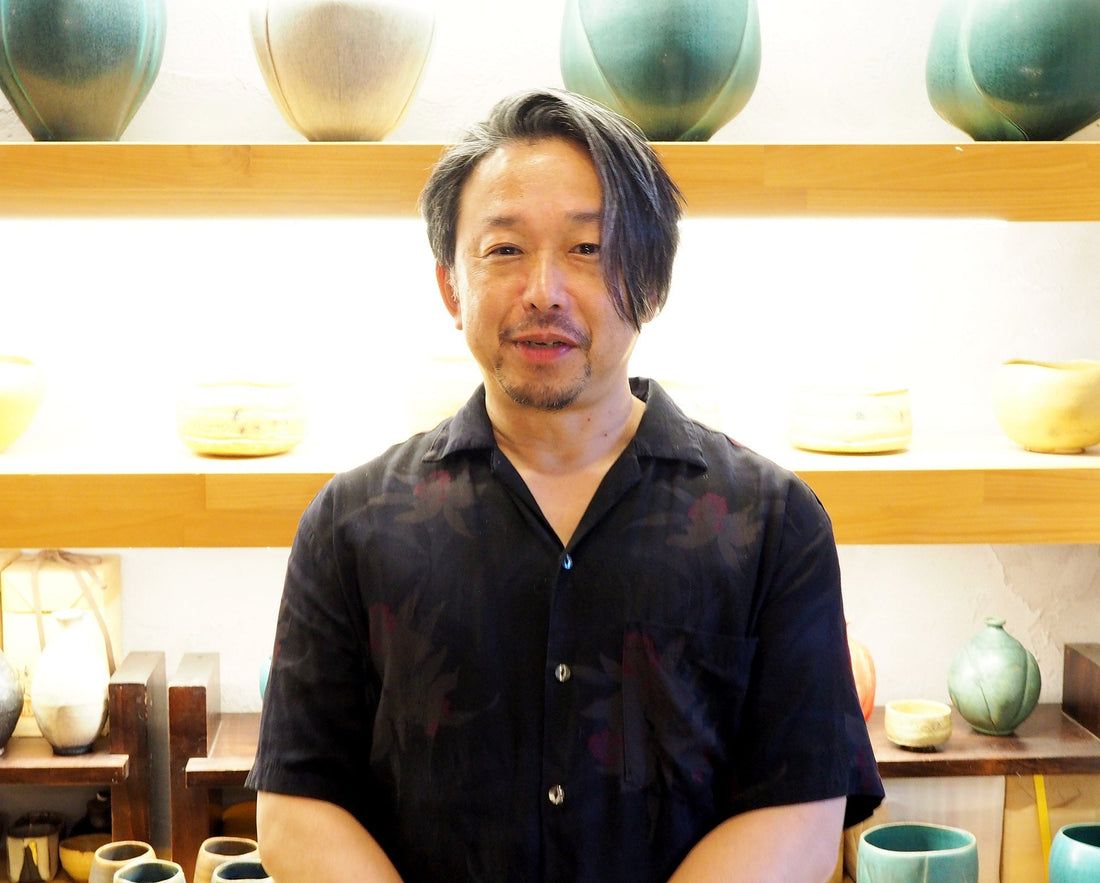
Interview with Tatsuya Kuroiwa
A ceramic artist who has moved from Bizen ware to Mino ware
Tatsuhiro Kuroiwa's Challenge and Evolution
Profile/Ceramics history
(Kuroiwa Tatsuhiro)
Born in Yokohama, Kanagawa Prefecture in 1970, originally from Chiba Prefecture. After graduating from the Okayama Prefecture Bizen Ceramic Art Center in 1995, he studied under Bizen Sue artist Yoshimoto Munemine. In 2001, he studied under Arita ware craftsman Kitagawa Yoshinori from Saga Prefecture. From 2003 to 2006, he began building kilns and making pottery in the Yatsushiro Basin, Shunan City, Yamaguchi Prefecture. In 2012, he moved to Kukuri Ohira, Kani City, Gifu Prefecture, and resumed building kilns and making pottery.
(Exhibition history as of 2025)
2015: The Presence of Traditional Crafts, MOA Museum of Art; 2016: Guide to Contemporary Ceramics, Ibaraki Prefectural Ceramic Art Museum; 2017: Mino Ceramic Art Grand Prize Exhibition, Toshin Mino Ceramic Art Museum; 2018: Heart-Pounding ♥ COLORS: The Coloring of Kiln Art, Ibaraki Prefectural Ceramic Art Museum; 2018: Inheriting the Shino Oribe Tradition from Momoyama to Shino, Sokou Museum of Art; 2022: Ceramics Connecting to the Future: The Power of Traditional Crafts, Panasonic Shiodome Museum of Art.
(Award history as of 2025)
2014: Gifu Takashimaya Award (Encouragement Award) at the 45th Tokai Traditional Crafts Exhibition; 2015: Gold Award at the 21st Shoroku Award Tea Bowl Exhibition; Mino Ceramic Art Grand Prize at the 42nd Mino Ceramic Art Exhibition; 14th Kakiemon Memorial Award (Excellence Award) at the 3rd Tobi Exhibition; Japan Crafts Association Award (Highest Award) at the 46th Tokai Traditional Crafts Exhibition; Selected for the 6th Kikuchi Biennale; 2016: Selected for the Hagi Grand Prize Exhibition IV; 2017: TOKI Skein Award (Excellence Award) at the 10th Contemporary Tea Ceramic Exhibition; 2019: Award Nominee at the 25th Japan Ceramic Art Exhibition; 12th Contemporary Tea Ceramic Exhibition TOKI Oribe Skein Award; 2020: Encouragement Award at the 13th Contemporary Tea Ceramic Exhibition TOKI Skein Award; 2021: Received the Gifu Prefecture Traditional Culture Successor Award, Japan Crafts Council Award at the 49th Traditional Crafts Ceramics Division Exhibition, Tono Shinkin Bank Award at the 48th Mino Ceramics Exhibition, Grand Prize at the 25th Mino Tea Bowl Exhibition in 2022, TOKI Oribe Award for Encouragement at the 14th Contemporary Tea Ceramics Exhibition, Gifu Prefectural Board of Education Award at the 54th Tokai Traditional Crafts Exhibition in 2023, TOKI Division Award for Encouragement at the 15th Contemporary Tea Ceramics Exhibition, and is held in the collections of the Toshin Ceramic Art Museum, Ibaraki Prefectural Ceramic Art Museum, Toki City, and Kani City.
We visited ceramic artist Tatsuya Kuroiwa at his studio in Kukuri Ohira, Kani City, Gifu Prefecture, which overlooks lush greenery and a peaceful rural landscape.
The path to pottery and the challenge of entering the world of Bizen ware
Tatsuya Kuroiwa was born and raised in a salaryman's family, and spent his childhood moving around Japan before settling in Chiba Prefecture as a teenager. After graduating from high school and turning 20, he began to feel inferior because he felt like he was nothing, and began to feel like he wanted to pursue his own path.
What is something that allows you to express something uniquely your own, establish your own existence, and pursue it as a lifelong career? The answer he found was pottery. Kuroiwa had lived a life completely unrelated to pottery, but as he researched production areas and techniques around the country and sought a path into pottery, he decided he wanted to work with Bizen or Shino. He ultimately chose the Bizen Pottery Center in Okayama Prefecture, which produces Bizen ware. At the time, there was a pottery boom, and the Bizen Pottery Center had a capacity of 20 places, with nearly 200 applicants, making it an extremely competitive environment. Despite this, Kuroiwa passed with flying colors and stepped into the world of Bizen ware.
During his time at the Bizen Ceramic Art Center, he learned not only the basic techniques of pottery, but also the philosophy and attitude towards pottery. Bizen ware values traditional techniques and has a very simple yet powerful beauty. Attracted by its profound possibilities for expression, Kuroiwa's passion for pottery grew even stronger.
After graduating, he spent about five years further honing his Bizen ware skills, then moved to Arita ware to study glazing. He also traveled to production areas throughout Western Japan, including Kumamoto and Yamaguchi, and came into contact with the pottery traditions and techniques of each region, gradually building his own style.

Encounter with Mino ware and moving to Gifu Prefecture
As Kuroiwa gained experience and honed his skills in pottery, a major turning point came in his life. That was when he met his wife. Kuroiwa, who was active as a potter in Yamaguchi, would visit Tajimi City, Gifu Prefecture, once a year to sell his pottery. He met his wife at a pottery event. Gifu Prefecture is the birthplace of Mino ware, and it is here that 22-year-old Kuroiwa, who decided to pursue a career in pottery, wanted to try his hand at Shino ware. Pottery, which marked a major turning point in his life, and meeting his wife, led him to move to the Tono region in southern Gifu Prefecture to fire Shino ware. In 2010, he established his pottery base in Kukuri, Kani City.
Living here was truly the beginning of a new challenge.
Coincidentally, the area where Kuroiwa set up his studio is a particularly historic holy ground for Mino-Momoyama pottery in Gifu Prefecture, and the area is also a historic site for pottery, with the remains of the kilns and studios of Toyozo Arakawa and Kozo Kato still remaining. After moving there, Kuroiwa himself began to sense the special significance of this "holy ground."
Kuroiwa will continue to deepen his pottery making activities by coming into contact with the history and culture of this Mino ware region.
What continues to fascinate Kuroiwa is that the field of pottery is a profession that allows him to grow throughout his life. He can express himself through pottery and observe himself maturing over time. In this world of pottery, he has chosen to walk a path that requires only hard work, steady accumulation of skills, and recognition without needing to speak up.

Kuroiwa's unique style and influences
Kuroiwa's style, which follows the traditional techniques of Bizen ware, Arita ware, and Mino ware while incorporating his own unique style, is influenced by music, from which he played in a band when he was younger, as well as other artistic fields such as fashion and design. While many of his works appear simple at first glance, they are packed with deep flavor and meticulous technique. The longer one looks at them, the more attractive they become, and they have the power to quietly move the viewer.
This may be due to Kuroiwa's strong interest in ceramics, which are not simply pottery as a practical item, but also as a cultural and artistic art. From this perspective, his works incorporate modern design and aesthetic sensibilities.
Kuroiwa creates Mino ware (Kiseto, Oribe, Shino, Setoguro) using modern techniques while respecting local materials and techniques, with his own unique approach and interpretation. The piece with its striking soft green is a modern version of "Kuroiwa Oribe." A modern version of Kuroiwa Setoguro is also in the works. Kuroiwa continues to take on new challenges every day, passionately blending traditional techniques with modern sensibilities to give form to his unique aesthetic sense.
Kuroiwa says, "I want to live my life thinking only about pottery; I don't even need a change of pace."


A passion for pottery that continues to this day
A fateful encounter with pottery that came about through chance in his early twenties.
Now, after more than 30 years of pottery making, what he values most is to continue to inspire and fascinate many people as a "voice" speaking in the quiet world of pottery.
Kuroiwa spoke in a relaxed and gentle tone, "When I discovered pottery, it was already the answer."
(October 2024, Interview: Chika Shimura)
information
Kuroiwa Tatsuta Workshop
1-416 Kukuri, Kani City, Gifu Prefecture, 509-0224




